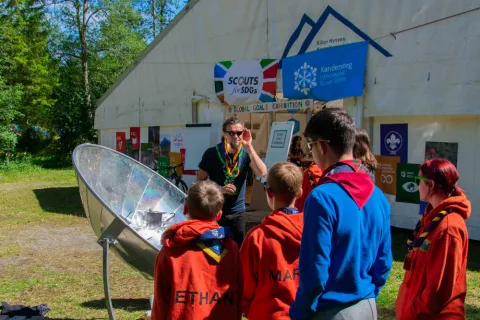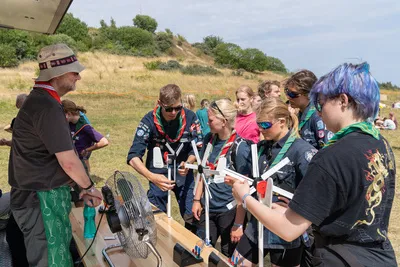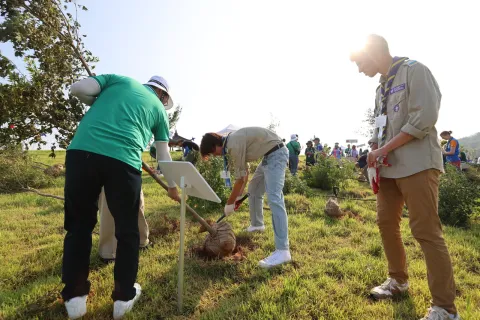Powering sustainable change through partnerships
Pollution reduction, Decarbonisation, Net Zero, Green House Gas emissions reduction, 1.5C pathway, science-based targets, climate, and biodiversity crisis – lots of different ways to say the same thing – that we urgently need to reduce our footprints, and at the time lend a hand to refill those that have already been left.
As Baden Powell said, “No one can pass through life, any more than pass through a bit of country without leaving tracks behind” and “Try to leave the world a little better than you found it”.
Some collective tracks or footprints are so big, like climate change, that it is only by working with others that we can make a meaningful difference in reducing our future footprints and working to cope with the impacts we already feel.

Copyright
©Luís Silva - KISC
Scouts worldwide have been working with others to support positive change for decades. There are thousands of inspiring stories of positive local impacts from combining Scout values, enthusiasm, and working with others for sustainable change.
It is a natural next step to bring this approach to a new scale to help tackle the biggest challenges of our time in a fun and inspiring way. For example, on 5 June, on the occasion of World Environment Day, the Scouts will join the Earth Tribe, an initiative focusing on developing the key competencies needed to enable young people to become environmental leaders.

Copyright
© WSB Inc. / Enrique Leon
The approach can also be applied to help us tackle the organisational side of these challenges, like how Scout National Scout Organizations can mitigate and adapt to climate change. The Scout Association is part of a Decarbonisation Roundtable of informal youth organisations in the United Kingdom. The Roundtable aims to work together and share knowledge, skills, and resources to support our organisations in accelerating positive climate action. As with any group, it has taken a while to settle in and find how we can best work together, but from the first meeting, it has already been an invaluable support, from discussing details of how the Girl Guides have carried out a carbon footprint assessment and their surprising results shaping how we are thinking about decarbonisation, to hearing tips and tricks from others on how they are tackling the barriers to changing to lower impact menus at their centres. Our current focus is co-designing and applying for funding for a collective climate literacy training programme.
Key takeaways from the Roundtable so far,
- The operational challenges are universal, even if the context is slightly different.
- There is someone, somewhere who has already tackled the challenge you are working with and they will be happy to share and support you.
- Don’t wait for the ‘right’ or ‘perfect’ solution; having a go, no matter how imperfect is the best and most needed action.
- Carbon footprint measurement isn’t easy, especially with limited capacity and technological support. So get comfortable with approximate and best guess data, and be transparent with others about what you don’t know. Then, focus on getting more detailed and accurate data (with the support of others) in the areas where you can make the most change and have the biggest impact.

Copyright
Hank Hyungkyu JANG
Although the power of collaborating, co-creating, connecting and partnering with others has long been recognised, I always find it wonderful when you begin to feel that special bit of magic that happens when people with a shared purpose choose to work together, and things click into place.
However, as I am sure many of you will know from experience, partnerships of any sort aren’t always plain sailing. They take time and effort, and often, the changes that they lead to aren’t those we had initially hoped or planned for! Taking a leap of faith and being open to what may emerge is often when the new, most interesting ideas and connections emerge.
Luckily, there is a wealth of support and experience that we can draw upon to help us navigate the challenges and opportunities of working with others, from the Partnering Initiatives helpful hints or Partnership Accelerators tool to the more detailed SDG partnership guidebook, which, although designed for country-level partnerships, holds some great advice for partnerships for change at any level. If you are new to partnerships for sustainability, then this article is a great starting point.
Whatever approach we choose to take, the answers and support we need are already out there somewhere. Many others who align with Scout values and are passionate and excited about getting to work are also out there. By linking up together, amazing opportunities and accelerated positive change can be found.
Rebecca Craske
Group Sustainability Manager
The Scout Association, United Kingdom
